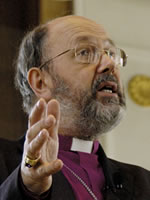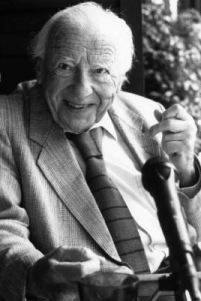
The question of how to read Scripture and what authority it can have over anyone's life is a serious one, especially in the skeptical Western Church. The Enlightenment project of "pure reason" (eat it Kant) has ultimately failed and produced a child which has wrought its own destruction: postmodernism and deoncstruction. How do conservative Christians read the Bible in light of postmodernism and the Western challenge of reason alone? Tom Wright in his latest amazing book The Last Word takes on both of these challenges. I want to do two "short" entries on this book, part I here on his statements of modernity and postmodernity and Scripture, part II on his way out of both with the classic three-fold understanding of "Scripture, Tradition, and Reason" within the five act model (which looks suprisingly similar to covenant theology, Wright is a Calvinist!).
Modernity
Wright makes the interesting point that in modernity something which was once connected to an overall picture of reality all of a sudden sundered itself and was raised to the highest form of authority: reason. Not the similarities with this discussion and what Radical Orthodoxy has pointed out through univocity of being and Duns Scotus. The appeal to reason during modernity was "not as an insistence that exegesis must make sense within an overall view of God and the wider world, but as a seperate "source" in its own right." Reason is now somthing totally seperate from creation and guess where the seat of reason is found: man. So whereas up until the Enlightenment reason meant coherence in the creational and providential plan of God, a full blooded reality, reason has now been seen as the sole factor in determining truth.
Postmodernity
All of this absolute reason, something which has never existed and makes no sense in terms of a created universe with a transcendent Creator (how can anything in the creation be predicated with absolute when there is a transcendent God who cannot be identical to creation?) comes to a crushing halt as postmodernity, modernity's own child, points out exactly how far this "reason" can get us: barely out the front door. "Postmodernity, by unmasking the power interests latent in texts and movements, not least those of the last two hundred years, has offered a sustained ideological challenge not only to many ancient and modern texts but to modernism itself." This is all old hat, but the implications for Bible reading is something well highlighted:
"All we can do with the Bible, if postmodernity is left in charge, is to play with such texts as give us pleasure, and issue warnings against those that give pain to ourselves or to others who attract our (usually selective) symapthy." Postmodernity leaves us no way to decide on what text has any credence since it equal deconstructs all texts and ideas. The impact in the church is staggering: "Much criticism, both modern and postmodern, has thus left the church, after years of highly funded research in seminaries and colleges, less able to use the Bible in anything like the way which Jesus and the earliest Christians envisaged." Modernity started cutting the Bible down (as enacted by Thomas Jefferson and his "personal" Bible of just a bit of Luke and some other "true" pieces) and postmodernity finished the job by gutting the Bible entirely. Now it is up to you to decide which text is good and bad, no longer is the Bible a lion which cannot be tamed, rather it is a carcass ready to be scavaged. "All that deconstruction achieves is a nihilism in which the only relief is a kind of hermeneutical narcissism, taking one's pleasure with the text and letting the rest of the world go by unnoticed." The Bible is meaningless in the Western Church today because we have bought into this system.
But is this really where we want to be? We have allowed the Bible to be mutilated and finally totally tamed. In what sense is the Bible than to have authority over our lives? How is it ever to do the work which it so clearly seems to be set out to do? How can the Bible change lives? The only way this is going to happen is if we get rid of the man centred idea of reason vs. revelation and return to an uncompromising position of Bible first. This is the view of the Reformers, and we have even more tools in which to determine what the Bible says, but we have to admit that whatever it says is not to be judged as right or wrong by our standards, rather we are to be judged by it. But to make sense of the Bible from this perspective we can no longer see it as some isolated text among many: it needs to be central to the Church and to the world as the way in which God reveals and governs his world. Or to let Wright speak: "the phrase 'authority of scripture' can make Christian snese only if it is a shorthand for 'the authority of the triune God, excercised somehow through scripture.'" Now it is not a dead text, put a living revelation of the plan of God, active through the Spirit and made a part of our lives for the redeeming of the world.


3 Comments:
"The only way this is going to happen is if we get rid of the man centred idea of reason vs. revelation and return to an uncompromising position of Bible first."
I'm all for getting rid of the reason vs. revelation distinction, but putting the Bible first uncompromisingly doesn't do that. That maintains the distinction, but asserts the supremecy of Scripture over reason. I simply can't roll with that - it's saying we should ignore any idea that our revelation is flawed, and simply believe it wasn't, because the reformers, or the ancient church, or whoever, did. What if it is flawed?
Your answer would probably be to point out the dodginess of this assertion - that the Bible is not flawed, and so believable. This is using reason to support the authority of scripture, which is NOT putting scripture first, but rather second.
Simply put, you can never argue that it's reasonable to put reason second to anything, because the implicit use of reason to assume the necessity of such a proof undermines the position.
I think you're going to have to come out with some sort of theory on how the Bible is the way to reason, that the two are meshed and intertwined, which seems to be more fitting with RO. You need to throw away the distinction altogether, and argue that reason and the Bible shouldn't be in conflict at all, and only a flaw in our understanding of what the Bible is meant for or what "Reason" allows us to believe this false dichotomy.
Tom Wright is poison. Mark my words.
I much prefer this Illuminated understanding of the Bible and Christianity
1. www.dabase.net/proofch6.htm
John
Post a Comment
<< Home